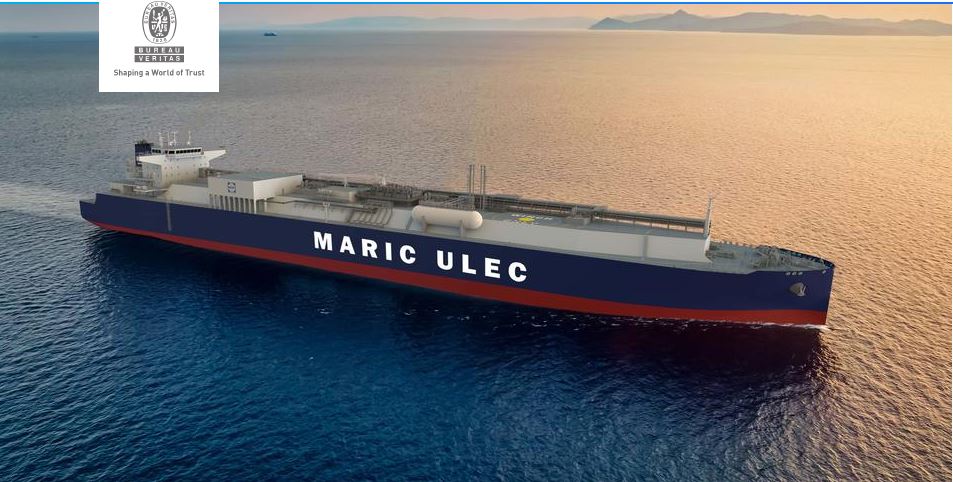 Bureau Veritas Marine & Offshore (BV) awarded an Approval in Principle (AiP) to the Marine Design and Research Institute of China (MARIC) for its 155,000m³ Ultra Large Ethane Carrier (ULEC) design, according to BV's release.
Bureau Veritas Marine & Offshore (BV) awarded an Approval in Principle (AiP) to the Marine Design and Research Institute of China (MARIC) for its 155,000m³ Ultra Large Ethane Carrier (ULEC) design, according to BV's release.
The vessel, with dimensions of approximately 274 meters in length and 42 meters in breadth, operates as a single-propeller liquefied ethane carrier powered by a MAN ME-GIE ethane dual-fuel main engine. It is designed for global ethane transportation and can also carry ethylene, propylene, and LPG.
The design incorporates Type B cargo tanks and GTT Mark III membrane tanks, providing a lower boil-off rate, reduced unloading residue, and increased cargo capacity utilization.
Fuel efficiency is addressed through optimized hull lines, propellers, rudders, and energy-saving components, including propeller cap fins, a pre-swirl duct, and a shaft generator.
The vessel integrates MARIC’s Smart Ship Solution, which includes a Smart Navigation System (SNS), an Energy Efficiency Management System (EEMS), and a Machinery Health Management System (MHMS) to improve safety, operational efficiency, and sustainability.
BV evaluated the design based on its classification rules and key notations, utilizing its experience in gas carrier classification, including Very Large Ethane Carriers (VLECs). The assessment process will involve structural strength evaluation, non-linear fatigue analysis, crack propagation studies, and leakage risk assessments.
Bureau Veritas Marine & Offshore is a division of Bureau Veritas, a global company established in 1828, specializing in testing, inspection, and certification services. Headquartered in France, BV operates in nearly 1,600 offices and laboratories worldwide with approximately 80,000 employees. In the maritime sector, it provides classification, certification, and technical assessment services for ships and offshore structures, focusing on safety, quality, and environmental compliance. It serves around 400,000 clients globally, including in the gas carrier industry.
Marine Design and Research Institute of China (MARIC), based in China, is a ship design and research institution under the China State Shipbuilding Corporation (CSSC). Founded in 1950, it focuses on developing maritime vessels, including commercial ships, gas carriers, and specialized designs.
MAN Energy Solutions (Provider of MAN ME-GIE Engine), headquartered in Augsburg, Germany, is a subsidiary of the Volkswagen Group, with roots dating back to 1758. It specializes in engineering solutions, including marine engines, power plants, and turbomachinery. The MAN ME-GIE (Gas Injection Ethane) engine referenced in the news is part of its portfolio of dual-fuel engines designed for efficiency and reduced emissions in maritime applications, serving the global shipping industry.
GTT (Gaztransport & Technigaz), based in France, is a technology and engineering company established in 1994 from the merger of Gaztransport and Technigaz. It designs containment systems for the transportation and storage of liquefied gases, such as the GTT Mark III membrane tanks mentioned in the news. GTT’s solutions are widely used in LNG and ethane carriers, supporting the maritime energy sector with a focus on safety and efficiency.



